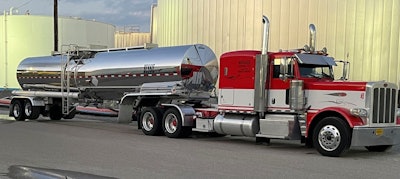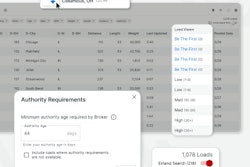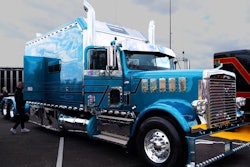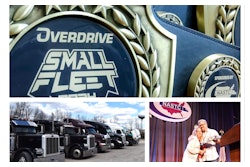
No matter what sort of trucking you do, challenges abound. Whether it’s long waits at shippers and/or receivers, tarping and strapping, journeying to remote locations or something else, plenty can make an owner-operator's business difficult -- and that’s not even considering rates. Ask any owner-operator at any point over the decades of this century, after all: rates could always be better.
For owners in one or another of the specialized liquid-bulk tanker niches that exist -- hazmat chemical, food grade, fuel and others -- difficulties are equally specialized in some ways, yet many of the biggest challenges probably look familiar to owners in other niches.
A recent survey of liquid-tank toters among Overdrive’s owner-operator and small fleet audience asked for top business challenges: the most-named (by 44% of the respondents) was the near-ubiquitous increase in costs outpacing rates and revenue growth. Other cost-related issues for tank owner-operators, too (insurance, equipment) accounted for combined 43% of respondents’ top named challenges.
Yet the tank niche offers advantages, too:
- Generally better freight rates than other niches, though diligent owners must consider tank wash necessities, deadhead miles and other factors.
- Leasing can relieve cost burdens of the expensive trailer equipment, tank washouts with drop-and-hook.
- Independents with an eye toward growth turn investment into sales, steady freight with direct contracts.
[Related: Think tank: Overdrive's last close look at the tanker niche, published in 2019]
Taking advantage of liquid-bulk opportunity, where it exists
Fred Stair, owner of one-truck Tristate Haulers out of Spring, Texas, leans into versatility. The owner-operator owns not only a chemical tanker but a flatbed and a reefer, too. He tends to stick to tanker work, though -- the “rates are definitely better in the chemical sector,” he said.

At first blush, tanker rates do tend to look considerably higher. In many cases, an offer rate often takes the “backhaul” with it. That is, deadhead miles back to the original shipper to be reloaded have to be figured in. Paul Midgett, who owns Osceola, Missouri-based Bessie Liquids LLC, said his rates are “better than most,” but he’s also often getting paid for out-and-back, not just one way.
A lot in earning opportunity will depend on how well an owner-operator builds a base of freight partners, noted Stair. “I know a lot of guys that are working for like $2.50 a round-trip mile, which … if you can pick up a return load" at the same rate, "you’re $5 a one-way mile."
Those opportunities aren't as rare as you might think, "if you have the right customer base and they can have work,” he said.
Midgett is contracted directly with some of the largest chemical companies in the United States and admitted his rates tend to be on the high side, limiting opportunities to work with brokers to fill in the gaps for his 30 leased owner-operators. He does have certain brokers that he’s worked with, though, who will call him when they need a load moved and will pay what he’s looking for.
It's generally difficult for small business owner-operators to work their way in with the large chemical companies, however.
As owner-operator Stair notes, big producers like that "don’t want to deal with a one-truck operation," he said. It's a double bind for many independents. "For me to grow," he added, "I have to have some sort of ... not guarantees, but at least they have to show me a need," that the freight is there for him at a rate and volume that can sustain investment in added equipment, new people.
Those dynamics are the reason so many owner-operators choose rather to lease to larger tanker fleets with more sales and operational support.
Owner-operator John McCaughey has done just that with Dana Transport. He started with the company as a driver in 2008, then in late 2017 bought his own truck and leased it to them. He’s compensated 62% of linehaul, in addition to receiving 100% of a fuel surcharge and billable tolls. Dana’s fuel surcharge, he said, is also based on a percentage of the linehaul rate.
 John McCaughey is today operating in this 2018 Freightliner Coronado glider outfitted with a Series 60 Detroit.
John McCaughey is today operating in this 2018 Freightliner Coronado glider outfitted with a Series 60 Detroit.
That 62% of linehaul might sound low, but Midgett said it’s fairly standard practice in the tanker world given both rates themselves as well as costs are higher. “The company isn’t going to give you a higher percentage because they don’t have to, for one thing,” he said.
McCaughey noted that as a leased owner-operator for a larger company, he's noticed that the rates he sees tend to be more consistent than what he sees in other segments of the industry. "They pretty much stay at a rate where you don't experience the feast-or-famine type deal," he noted.
"Some of these tank washes can be upwards of $500, depending on the product.”
--Owner-operator Fred Stair in Part 2 of this feature
Unlike Midgett, who has direct contracts with shippers, owner-operator Stair primarily works with brokers for his tanker work. When he started Tristate Haulers in 2008, he loaded through several, but today he’s honed that down to the best relationships he's built through the years. Nearly all of his work, he notes, “historically, I have it through text message, direct phone call or email. I don’t really use a load board to get my work.”
Last December he landed a direct customer that he hopes is able to continue to help him seasonally. “It’s a de-icing contract," he said. "They get me work here and there … and I try to accommodate them."
With de-icing chemicals at a low demand ebb in the summer months, "Most of my stuff comes from brokers right now,” Stair said.
Barriers to tanker entry: Equipment, insurance costs sky-high for independents
 Owner-operator Fred Stair, owner of Tristate Haulers LLC, keeps his operation old-school with this 1988 Peterbilt 379. Stair primarily pulls the 2003 Tremcar tanker pictured here. He keeps his options open, however, with a flatbed and a tri-temp reefer that he also owns.
Owner-operator Fred Stair, owner of Tristate Haulers LLC, keeps his operation old-school with this 1988 Peterbilt 379. Stair primarily pulls the 2003 Tremcar tanker pictured here. He keeps his options open, however, with a flatbed and a tri-temp reefer that he also owns.
For independent owner-operators like Stair who own their own tank trailers, the cost of entry to the niche isn’t going to be cheap. Overdrive’s survey of tanker operators found equipment costs were the biggest challenge for 17% of respondents.
Paul Midgett and his Bessie Liquids business run single-compartment tankers ranging from 5,500-gallon to 7,000-gallon capacity. The trailers themselves today run in the ballpark of $120,000 new, he said, yet then he adds meters to many of them for about $30,000 apiece. Meters allow for accurate readings at customers to know exactly how much product has been pumped off the trailer, useful for multi-stop loads.
“I have meters on most of the trailers, which means I load 5,000 gallons, and I’ll drop a thousand gallons here, I’ll drop a thousand gallons there. I can do multi-stops in a single-compartment trailer,” he said.
Even more liquid-tanker haulers highlighted insurance costs as their biggest challenge, particularly those who haul hazmat, where required minimums for liability insurance coverage can be as high as $5,000,000. Midgett said insurance is a "huge cost” for his business, with 30 owner-operators leased on. He paid “in the neighborhood” of $350,000 for insurance this past year, he said, which comes out to a little less than $12,000 per unit.
That's even with “a really good rating,” he noted, with “no huge wrecks” during his time in business -- a significant reason he feels his insurance rates are on the lower end.
As Midgett put it, “There is no such thing as just a wreck in our world. It’s a catastrophic affair if there is one. If it breaks the tanker, you’ve got a huge mess.”
Hazmat haulers are required to carry anywhere from $1 million to $5 million in liability coverage, depending on what they’re hauling.
For a new tanker owner-operator, Fred Stair believes, insurance will be the biggest hurdle. For him personally, he “had a very good policy, but a couple of customers needed me to upgrade to a $5 million policy, which pretty much doubled my insurance from what it was,” he said. “It’s high, but it’s manageable. For me it’s manageable. I keep my costs low. Everything I have, I own, so I have no notes on” equipment.
Bedrock rates and cost challenges aren’t the only ones tanker haulers address with time and experience. Other issues are unique to tanker work and put time and safety into clear relief. Read about them in Part 2 of this feature next week here at OverdriveOnline.com.
Read next: Tank washouts bring cost, time investment into focus for liquid bulk niche haulers















